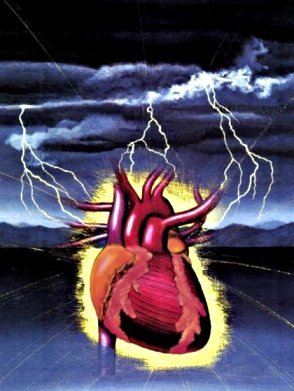
Although we may not consciously remember being separated from our mothers, our hearts know it, as surely as if we had been struck by lightning.
The three paragraphs below are quoted from a religious article by Kim Thoday, available here.

“Dr. Paul Pearsall, a psycho-neuro-immunologist ... has written a book entitled The Heart's Code. Pearsall postulates a relatively new scientific theory. He maintains that although the heart's physiological function is to pump blood through our lungs and then that oxygen-rich blood throughout our body, it also has a significant role to play in the deeper realm of one's memory.
To that extent, he believes the heart has the capacity to love and to feel other emotions. Furthermore, he extrapolates that the heart stores information, shares energy throughout the body, and even communicates with other hearts. Pearsall offers some persuasive research and anecdotal evidence of heart patients for his thesis. Central to his thesis is the idea of "cellular memory" - that is, that our bodies' cells contain an in-built mechanism to codify and store significant memories of our lives.
It is interesting to consider that in poetry, art and religion, from time immemorial to the present, the human heart has often been portrayed as that place where the most profound of human emotions are felt. In everyday language we use many metaphorical expressions about the heart: heartache, heart of the matter, heartfelt, broken heart, bleeding heart, heart of darkness, heartening, disheartened, lonely heart, hearty, sweet heart, take heart, and so on............”
The ancient Egyptians believed that the heart contains a record of all your past deeds, and that it is the centre of intelligence and the emotions. When mummifying a dead person they would leave the heart in the body because it was so important, but they discarded the brain as being of little value. In Asian religious philosopy and culture, no clear separation has ever been made between the heart and the mind. The terms are virtually synonymous, and in Pali the word used for the mind/heart is Citta. The seat of consciousness is considered to be the heart area of the body, rather than the head.
It has taken Western scientists a while to catch up, but we now know that even if our brains are still immature or are not functioning normally, we are aware of everything that has ever happened to us.
Our hearts remember.